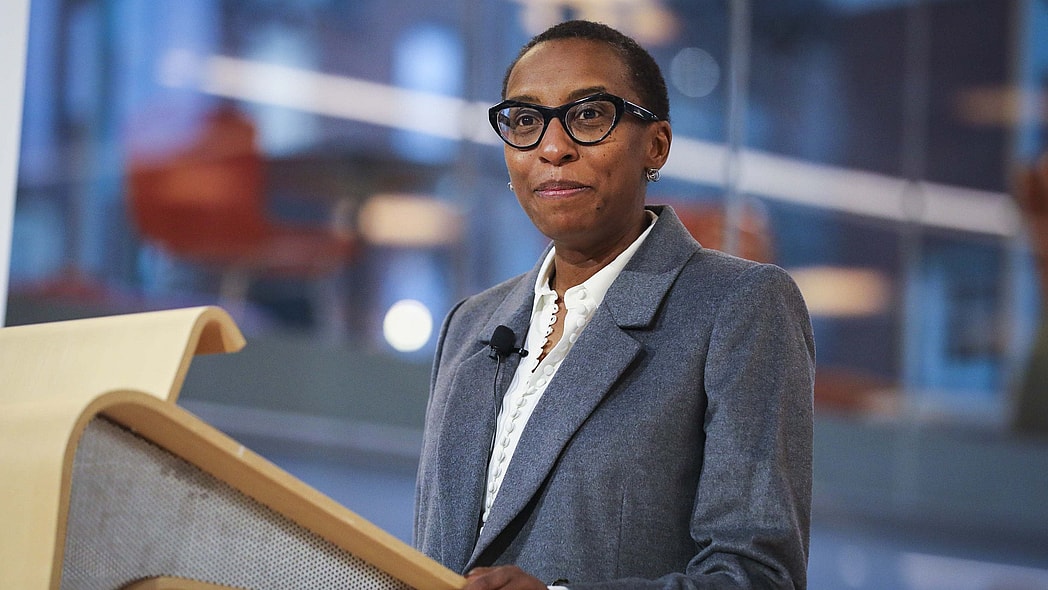Editor’s note: The following article is an op-ed, and the views expressed are the author’s own. Read more opinions on theGrio.
From the time Black children come into the world, they are told to be “twice as good.” The command is a form of protection. A reminder that no matter what spaces you may ascend to, someone will be waiting in the wings to pounce — to weaponize an error or gray area to deem you unworthy. It doesn’t matter if they do not hold themselves to the same standards, or if you have been exceptional in nearly all endeavors. It is you, Black child, Black teenager, Black adult, Black professional, who will be accused of being unfit, should the time come.
When Dr. Claudine Gay resigned as president of Harvard University on Tuesday in the wake of a ramped-up campaign to slander her name and reputation launched by conservative activists who dug up her 1997 dissertation with accusations of plagiarism, there was a collective deep sigh for many of grief and sadness.
We recognized this moment for what it represented; that scene we had been warned about from childhood. We understood that this was more complicated than a few paragraphs of inadequate citation (defended even by some of the academics whose work Dr. Gay drew from). This was bigger. In these scenarios where judgment calls are made, Black women do not get the same benefit of the doubt. And in an era where elite universities are now pawns for right-wing political activists hoping to dismantle DEI, this was another lost battle.
“We launched the Claudine Gay plagiarism story from the Right,” tweeted anti-critical race theory activist Christopher Rufo smugly before her takedown. “The next step is to smuggle it into the media apparatus of the Left, legitimizing the narrative to center-left actors who have the power to topple her. Then squeeze.”
Media outlets played their part and regurgitated the plagiarism allegations until they became an immovable stain. Rufo’s plan worked in broad daylight and will be used again. In the vein of Maya Angelou, they told us who they were, and we should keep believing them.
In the joyous and nasty-spirited celebrations of Dr. Gay’s resignation from the likes of Rep. Elise Stefanik (who was removed by the Harvard Institute of Politics board for supporting election denialism in the wake of Jan. 6), we see the true aim of this campaign: To invalidate all efforts tied to diversity as lacking merit. To play into the worst stereotypes of Black people as intellectually inferior and unworthy of inclusion or promotion. To remind people of the consequences of not staying 100% in step and on-message with the pro-Israel lobby (however you judge the weaknesses of Dr. Gay’s Capitol Hill testimony).
“But what about the other white woman president who was forced to resign?” shout internet commentators who want to play devil’s advocate. What about her? Did activists dig up her academic record? Did she receive a torrent of racist phone calls or emails in the aftermath of her testimony? Did the media use her photo in tweets and articles degrading her intelligence?
Recommended Stories
Let’s not be naive. Most of us can barely remember the third university president’s name who testified on Capitol Hill, and that’s because this witch hunt stopped being about antisemitism long ago. Claudine Gay’s removal was always a 2-for-1 deal.
We should understand that the campaign to take down Dr. Gay is one that will continue until diversity, equity and inclusion (DEI) is destroyed. We saw it with Nikole Hannah-Jones and the University of North Carolina. We saw it in the striking down of affirmative action and lawsuits against Black-focused businesses and even maternity programs. And the indignity of these takedowns will chafe even more in an election year featuring a Teflon Donald Trump, who has broken every norm and rule of a president and gets a pass from his supporters and the GOP establishment to do it all again.
There is too much glee in the reactions to Dr. Gay’s resignation for this to just be about academic integrity. This is about sticking it to us undeserving Blacks who have “taken” spots from people who so feared competing with us, they inscribed segregation into law to preserve their advantage for centuries. Many of the critics daring to stomp on Dr. Gay’s academic record, couldn’t hold a candle to her accomplishments — they wouldn’t cut it in these institutions and that is why they bitterly seek wins to validate their intelligence.
In Dr. Gay’s resignation statement, we can almost hear the exhaustion of a weary soul who recognizes that the cost of being “the first” and staying resilient was too high even for her:
“It has been distressing to have doubt cast on my commitments to confronting hate and to upholding scholarly rigor—two bedrock values that are fundamental to who I am—and frightening to be subjected to personal attacks and threats fueled by racial animus,” she wrote, noting that she will return to teaching at the university and her hopes for Harvard remained “undimmed,” a remarkable statement despite all she’s been through.
As a Black Harvard undergraduate back in the early 2000s, I remember unveiling the portrait of the first Black Harvard woman-tenured professor, Dr. Eileen Southern. It was the first portrait of a Black woman to hang on campus ever — a small gem of appreciation in a sea of statues and photographic tributes to men, mostly white, some eugenicists and racists, long dead and gone.
The ceremony was led by the great Black neurophysicist Dr. S. Allen Counter, and as we pulled the curtain down, the room filled with applause and smiles, the photo of which was memorialized in Jet Magazine.
Yet as we applauded Dr. Southern’s accomplishments in musicology, little did I realize that Dr. Southern hadn’t always had an easy time at Harvard in the mid-1970s, having to fight for things as simple as getting librarians to order African-American books and finding herself rejected as a grad student before coming back to teach in 1974.
“You have to be very, very aggressive to get along with Harvard if you’re a woman,” Dr. Southern once said. “And to be a Black woman, I mean, it’s just a rough life.”
No one now understands this better than Claudine Gay.
With a new generation of Black students and young people looking to us adults for lessons from this moment, perhaps they are better served to know the truth: that even being “twice as good” won’t always protect you from people who need your failure to justify their blind rage.
Perhaps the best example will be Dr. Gay’s — if given a choice between carrying the weight of the world for flawed institutions who will not carry the weight for you and choosing to preserve your well-being, dignity and knowledge of your own goodness — in the end, there is nothing to prove. Choose you.
Natasha S. Alford is VP of Digital Content and a Senior Correspondent at theGrio. An award-winning journalist, filmmaker, and TV personality, Alford is author of the forthcoming book “American Negra.” (Harper Collins) Follow her on Twitter and Instagram at @natashasalford.
Never miss a beat: Get our daily stories straight to your inbox with theGrio’s newsletter.










